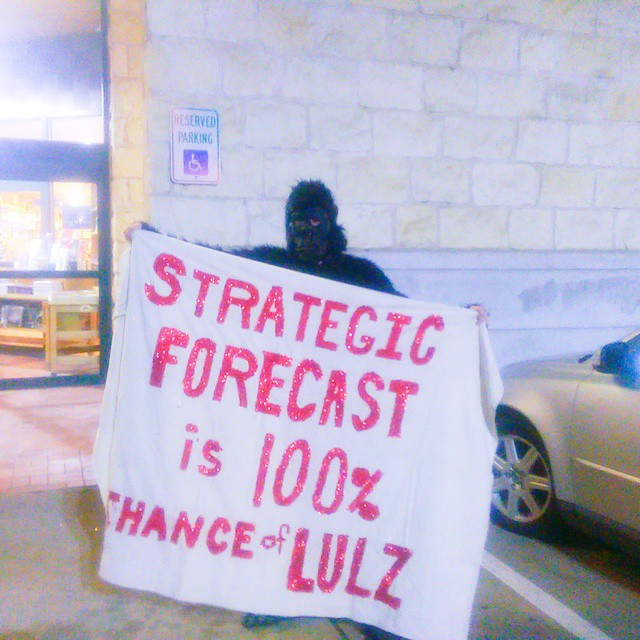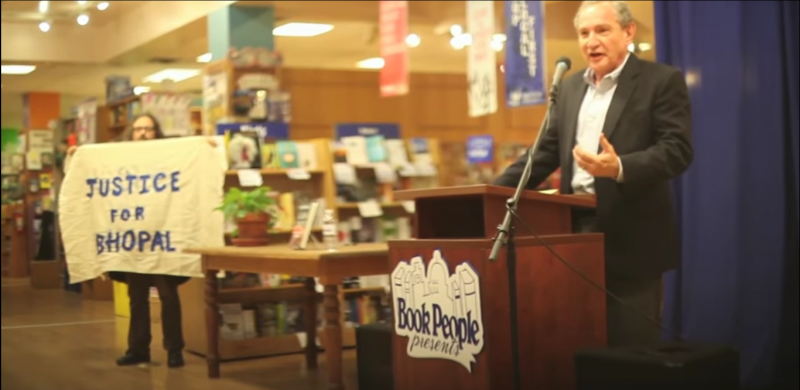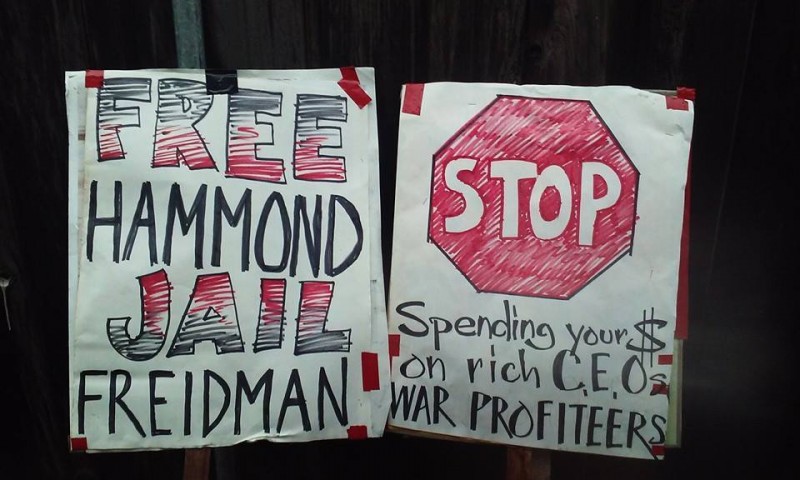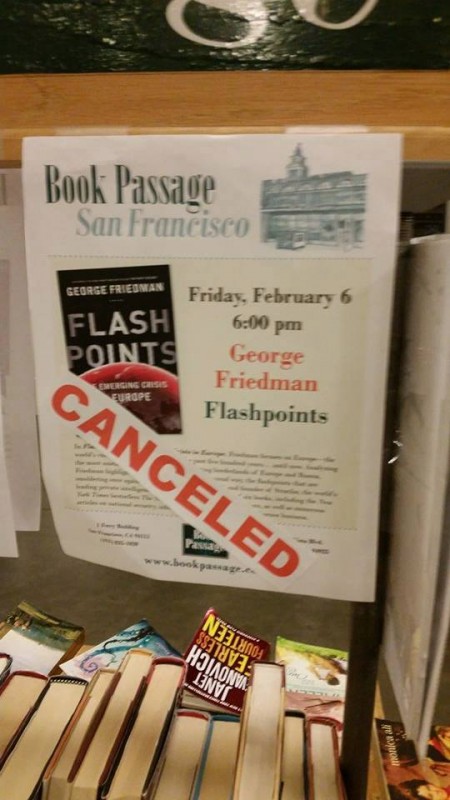VIDEO: Protesting George Friedman, CEO Of Stratfor, in Austin & San Francisco
by
Activists confront George Friedman, CEO of Strategic Forecasting at Book People in Austin, Texas on February 2, 2015
Austin, Texas — On January 22, journalist and political prisoner Barrett Brown was convicted in a Texas court of controversial charges. In addition to a 63-month sentence, Brown is expected to pay $890,250 in restitution to the private spy agency, Strategic Forecasting (a.k.a. “Stratfor”).
This monumental fine, which turns a theoretically free citizen into an indentured servant of a corporation, is meant to hold Brown responsible for a hack by the Anonymous group LulzSec — even though the government admitted it didn’t have any concrete evidence to show he’d taken any material part in the hack.
Jeremy Hammond, a member of LulzSec, pled guilty in May of 2013 and was sentenced to ten years in prison. The hack, carried out under the instruction of the FBI’s agent saboteur and snitch Sabu, revealed millions of emails that showed the complex interrelationship between the private intelligence firm, multinational corporations, and the surveillance state. The emails also revealed how Stratfor had infiltrated activist groups from Texas to India.
On February 2, 2015, George Friedman, Stratfor’s CEO, was scheduled to sign his book “Flashpoints: The Emerging Crisis in Europe,” at Book People, an independent bookstore in Austin, Texas. It would be Hammond’s 1,065th day in prison; Brown had been incarcerated for 874.
George Friedman, you should have expected us.
From Bhopal to Austin
Thirty years ago, the Union Carbide plant in Bhopal, India sprayed toxic gases into the air, killing over 4,000 residents and devastating the lives of hundreds of thousands more for decades to come. The victims, their families and descendents are still struggling for justice. There continue to be higher-than-normal rates of birth defects in the region.

An “Anonymous gorilla” (a protester in a gorilla suit) stood outside Book People in Austin, Texas on February 2, 2015 during George Friedman’s book signing. The gorilla’s banner reads “Strategic Forecast Is 100% Chance Of Lulz.” (Kit O’Connell)
Union Carbide refused to take responsibility and instead became part of the multinational giant Dow Chemical. Instead of paying reparations to the victims of the disaster or to clean up the environmental damage, Dow paid Stratfor to spy on the nonviolent activists that were bringing attention to the tragedy.
But there was something that made ruining Friedman’s night even more personal for me. The emails also revealed that in 2011, Strategic Forecasting had collaborated with the intelligence department of the Texas State Troopers to infiltrate Occupy Austin. I’d been a member and Hammond had tipped us off, even before he shared the millions of emails with WikiLeaks. While I’d be carrying a banner for Bhopal that night, I was doing it for Hammond.
I heard about the book signing from Azzurra Crispino of Prison Abolition & Prisoner Solidarity (PAPS) & the Anonymous Solidarity Network (FreeAnons). She’d been tipped off to the event and begun organizing a small group of local activists to respond. Because we wanted to maintain the element of surprise, we kept our planning off social networks.
It took only a handful of people to force Friedman to turn his book signing into a lecture on the evils of his corporation. One activist drove in from out of town with a gorilla suit and banner-making supplies. My backyard was the scene of the crime — there’s no use hiding it because there’s glitter all over still. I agreed to sneak the banner into the store and be the first major distraction. A handful of others secretly joined the audience while our gorilla stood outside to loudly draw attention and “rustle some jimmies” with another banner.
“It’s easy to fall into the trap of thinking of these organizations as faceless and above the law,” Azzurra told me later. “Stratfor as a corporation is not a person, but the corporation is made up of people including its founder George Friedman.”
“These individuals must be held accountable for their actions. Since the state reflects the interests of the .1% and not of the people, it will never hold the private-intelligence-complex accountable for its spying and infiltration of nonviolent protesters. It is up to the people to hold up the mirror of truth to them.”

Kit O’Connell confronts George Friedman, CEO of Strategic Forecasting (Stratfor), at a book signing while holding a banner reading Justice For Bhopal. Multiple activists disrupted this event at Book People in Austin, Texas. Emails obtained by WikiLeaks from Anonymous revealed that Dow Chemical paid Stratfor to spy on nonviolent activists seeking justice for the Bhopal, India chemical disaster. (Screenshot)
Peaceful but not quiet
Friedman’s reading took place on the second of three floors inside Book People, right at the top of a flight of stairs above the store’s science fiction, comic book and Forteana shelves where I’d spent a happy evening browsing. As I approached the top of the stairs, I pulled the banner from underneath my shirt and unfurled it.
I stepped off the landing, standing to Friedman’s right and just behind him as he spoke at a podium. Since the staff didn’t interfere with me immediately, I stood there silently as the audience and other customers reacted. Several took photos. One man tried to block his view of my banner by holding Friedman’s book in front of my face. Later, he would repeatedly and petulantly yell “write your own book!” during each successive disruption.
But the night was about making our voice be heard over the din of Stratfor’s money and power. I began to shout.
Justice for Bhopal!
Friedman is a crook!
Shame on corporate spies!
The event was completely disrupted for some time. Employees chased me first across the second floor and then back down the stairs. Rather than letting them herd me out immediately, I ran into the bookstore cafe.
It was very busy.
“Beware, there’s a corporate crook in the building!” I shouted to the surprised caffeinators, before resuming my series of chants.
Eventually a very angry man with a long beard and a black cowboy hat succeeded in chasing me out the door. I was gone from the property and in hiding before the cops arrived. The banner went in the trash and I scrubbed glitter from my hands in a bathroom sink.
The police arrived just in time for the next activist to be ejected from the store.
I wish I could have been there to watch the interactions between six cops, an angry cowboy, the gorilla, and the Communist who’d just been kicked out for reminding George Friedman that his “hometown bookstore” was “built on stolen indigenous Aztlán land.”
“What’s a lulz?” a cop asked the gorilla.
Audience member: Just remember, all publicity is good.
George Friedman: No, I can tell you that’s not true.
Changing the conversation
In the video above, you can see the real success of our tactic. Though Friedman drew some laughs from his audience, he seems visibly shaken and takes several moments to recollect himself.
And instead of immediately returning to his prepared speech, he finds himself recounting the story of the hack. He explains the accusations of activist infiltration, and the embarrassment of having millions of private emails and credit card numbers belonging to a “security” company revealed to the whole world via WikiLeaks and Anonymous.
Seemingly shaken, Friedman admits he has only excuses. “The answer to [accusations of spying] is no, we weren’t,” he says, “but that’s such a lame answer I don’t know how to give it.”
“It was a mess and it wasn’t fun. And one of the things that wasn’t fun was that [interruption],” Friedman concludes. “But I guess I’m in good company: The NSA, the State Department, the US Army, and Sony, so to hell with them.”
But the lulz weren’t over. During the question and answer period, Azzurra asked George Friedman, “Do you regret helping the FBI to entrap that Anonymous hacker?”
Flustered again, he denied collaborating with the FBI.
“Court records clearly show that Stratfor was asked by the FBI to allow the hack to happen and they complied,” she told me later. “They could have instead chosen to shore up their security and not cooperate. It is paramount street activists ensure corporate choices come with the price of public ridicule and disruption so the next time a truth-seeking hacker is set up by a government agency, executives know they will be held personally accountable for that cooperation.”
Finally, as Friedman signed books, a final audience plant brought up a copy of Flashpoints and read out a dedication:
Happy 30th Birthday, Jeremy Hammond.
Friedman got as far as Jeremy’s first name before stopping.

Two picket signs prepared for George Friedmain’s book signing in San Francisco. One reads, “Free Hammond, Jail Friedman.” Another: “STOP Spending Your $ On Rich CEOs and War Profiteers.” (Ronin)
From Austin to San Francisco
On February 6, 2015, George Friedman was scheduled to speak at Book Passage In San Francisco. Sue Crabtree of FreeAnons began contacting local activists immediately after the Austin protest.
“I must say, San Francisco and its activist community never ceases to amaze me,” an activist named Ronin told me. “I believe it was Monday or Tuesday when I found out about the signing via Sue. By Wednesday night, we had organized to act on several levels.”
This time the organization took place openly on social media including Facebook. The San Francisco Occupy Action Council sent out a mass email. Organizers held a sign making party — in addition to disruptive members of the audience, there would be a picket outside the bookstore.

At Book Passage In San Francisco, California, a flier announces Friedman’s February 6, 2015 book signing. However, a sticker affixed atop announces that the event is CANCELED. (Ronin)
“If people remain unaware of the negative impacts that Stratfor has had upon the environment and human lives, there is very little chance that there will be any positive change on those levels,” said Ronin.
“We need to make sure that people in charge of, or that perform acts that cause such a negative impact upon humanity know they are being watched, and to at least some level are being held accountable,” Ronin said.
Sue Crabtree elaborated: “It’s our duty to remind people like George that we fully intend to be there each time he signs a book and to ask him how much money it takes to buy someone like him. The public has a right to know exactly what companies like Stratfor are up to.”
This time George expected us.
And canceled his book signing.
Afflicting the comfortable
There’s some people in the world — let’s call them Dicks — who are unrepentant about the evil they do. Yes, they’ll tell you if confronted, I tortured the innocent. I started a war based on lies.
Most people aren’t comfortable enough to be Dicks. For the rest, their self-image depends on the story they tell themselves.
In George’s story, he goes by the mild-mannered title of “political scientist.” He also uses benign words like “author” and “analyst” to describe his work. The audience at his book signing mostly believed his story. Rich, white people who think they need people like George to keep them safe from the chaos and instability of the world. Because he can explain it.
Instead of George Explains It All, George had to explain why we accuse him of belonging to an undemocratic shadow government that answers not to the people, but only to the dollar.
Later that night, as he tried to fall asleep atop some impossibly expensive mattress, it must have been just a little harder to ignore the voice reminding him that he’s not one of the good guys.
And Azzurra wants George to know:
“As long as Jeremy Hammond and Barrett Brown remain incarcerated for showing us the truth about Stratfor’s practices, the individuals responsible for making high level decisions at Stratfor should expect us.”
